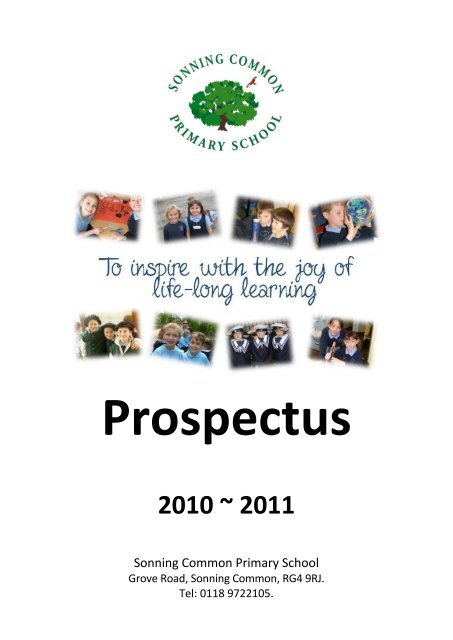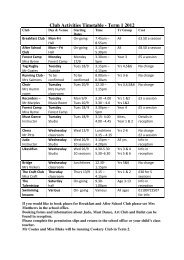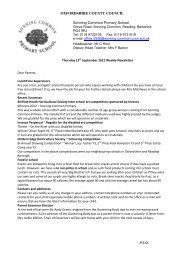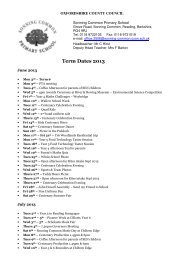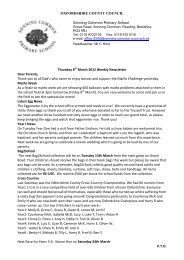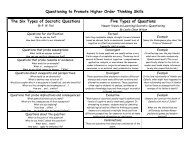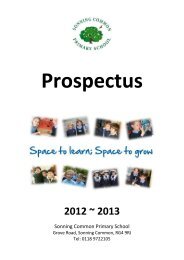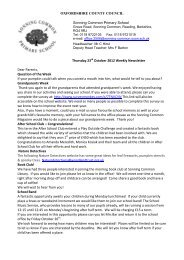2010 ~ 2011 - Sonning Common Primary School
2010 ~ 2011 - Sonning Common Primary School
2010 ~ 2011 - Sonning Common Primary School
You also want an ePaper? Increase the reach of your titles
YUMPU automatically turns print PDFs into web optimized ePapers that Google loves.
Prospectus<strong>2010</strong> ~ <strong>2011</strong><strong>Sonning</strong> <strong>Common</strong> <strong>Primary</strong> <strong>School</strong>Grove Road, <strong>Sonning</strong> <strong>Common</strong>, RG4 9RJ.Tel: 0118 9722105.
<strong>Sonning</strong> <strong>Common</strong> <strong>Primary</strong> <strong>School</strong>ContentsWelcome to <strong>Sonning</strong> <strong>Common</strong> <strong>Primary</strong> <strong>School</strong> 3Admissions Policy and <strong>School</strong> Visits 4<strong>School</strong> Term and Holiday Dates 5<strong>Sonning</strong> <strong>Common</strong> <strong>Primary</strong> <strong>School</strong> Staff 6Class Organisation and Teaching Staff 7The <strong>School</strong> Day 8<strong>School</strong> Uniform 9<strong>School</strong> Meals 10Health and Safety, Hygiene and Care 11The <strong>School</strong> Curriculum 12Education in Human Values 13Religious Education / Sex Education 13Children with Special Educational Needs 14Home learning 15Discipline and Behaviour Management 15Home <strong>School</strong> Links 16Complaints Procedures 17Resources and Clubs 17The Breakfast Club 18The After <strong>School</strong> Club 18Links with Other Educational Establishments 19Charging for Activities 20Insurance 21The Role of the Governing Body 22The Governing Body 23To inspire with the joy of life-long learningwww.sonningcommonprimary.co.ukPage 2 of 23
<strong>Sonning</strong> <strong>Common</strong> <strong>Primary</strong> <strong>School</strong>Welcome to the community of <strong>Sonning</strong> <strong>Common</strong> <strong>Primary</strong> <strong>School</strong>.Our school is a values-led community school, which means the life of the school iscentred on making good relationships, on teamwork and caring for others. The staffhere are dedicated to providing an education for the whole person, giving them anexciting and interesting start to life-long learning.All aspects of children’s learning are important and there are opportunities to enjoysport, drama, dance, music, the environment, a foreign language, as well as the allimportant skills which enable children to be literate, numerate and scientific.We encourage learning in many different ways through the use of excellent facilitiesat the school such as the library, the swimming pool, the computer room, largeclassrooms and extensive grounds. The staff are a wonderful blend of wisdom,youth and experience. An energetic governing body and a very active ParentAssociation support them. All of these adults provide a calm and nurturingenvironment for the children.We are most fortunate in having Bishopswood Special <strong>School</strong> on the same site. Byworking and playing with Severe Learning Disabilities (S.L.D.) children ourmainstream children gain valuable social skills that will remain with them for therest of their lives.The school welcomes parent help in the classroom and encourages parents toexpress their views through questionnaires and regular meetings. We value highlythe contact between home and school, knowing the process of educating a child is apartnership. Parents and teachers working together will give children the bestopportunity to develop talents and encourage tolerance, independence, goodbehaviour and positive attitudes towards learning.Mr. Chris HirstHeadteacherMrs. Jackie MillionChair of GovernorsTo inspire with the joy of life-long learningwww.sonningcommonprimary.co.ukPage 3 of 23
<strong>Sonning</strong> <strong>Common</strong> <strong>Primary</strong> <strong>School</strong>Admissions Policy<strong>Sonning</strong> <strong>Common</strong> <strong>Primary</strong> <strong>School</strong> serves the <strong>Sonning</strong> <strong>Common</strong> village catchmentarea. <strong>School</strong> starters from inside and outside the <strong>Sonning</strong> <strong>Common</strong> catchment areaare processed through the Oxfordshire Admissions Office, places permitting.Children who come from other schools during years 1 to 6 transfer only after properconsultation with the Headteacher of the school they currently attend.Children are admitted at the commencement of the year during which they have theirfifth birthday. The maximum admission number allowed is 60 pupils in each agegroup.Applications to the school are given priority as listed below:-I. Children resident within the catchment area2. Siblings of children already in attendance at the school3. Siblings of children already at Bishopswood Special <strong>School</strong>4. Children of members of staff of either school.5. Children from outside the catchment areaIf there is a problem about an application it will be assessed by a committee consistingof the Headteacher and two other members of the governing body. Further appealscan be made to the Chief Education Officer if the matter is not resolved to thesatisfaction of parents.<strong>School</strong> VisitsThere are two formal Open Afternoons a year to which prospective parents areinvited. This provides a guided tour of the school grounds and an opportunity to meetthe head teacher, parent governors and pupils.Alternatively, parents can make individual appointments to visit the school.In both cases the school secretary should be contacted on 0118 972 2105.To inspire with the joy of life-long learningwww.sonningcommonprimary.co.ukPage 4 of 23
<strong>Sonning</strong> <strong>Common</strong> <strong>Primary</strong> <strong>School</strong>Term 1Wednesday 1 st September - INSET<strong>School</strong> Term and Holiday Dates <strong>2010</strong> ~ <strong>2011</strong>Thursday 2 nd September – Thursday 21 st October <strong>2010</strong>Friday 22 nd October - INSETTerm 2Monday 1 st November – Friday 17 th December <strong>2010</strong> (school finishesat 1.15pm)Term 3Tuesday 4 th January <strong>2011</strong> INSETWednesday 5th January – Thursday 17 th February <strong>2011</strong>Parent Consultation Day – Friday 18 th FebruaryTerm 4Monday 28 th February – Friday 8 th April <strong>2011</strong> (school finishes at 1.15pm)Term 5Tuesday 26 th April – Friday 27 th May <strong>2011</strong>Bank Holiday Monday 2 nd MayTerm 6Monday 6 th June – Thursday 21 st July <strong>2011</strong> (school finishes at 1.15pm)Friday 22 nd July - INSETTo inspire with the joy of life-long learningwww.sonningcommonprimary.co.ukPage 5 of 23
<strong>Sonning</strong> <strong>Common</strong> <strong>Primary</strong> <strong>School</strong>Staff at <strong>Sonning</strong> <strong>Common</strong> <strong>Primary</strong> <strong>School</strong>Mr Chris Hirst ~ Head teacherMrs Flora Barton ~ Deputy Headteacher (Assessment and Maths Key Stage 2)Mrs Jill Pound ~ Head of Key Stage 1 and Foundation Stage (Maths Key Stage 1)Miss Rachel Offer ~ Head of Key Stage 2 (Literacy Key Stage 2, Gifted & Talented)Mrs Lynne Hems ~ SENCo (Science)Mrs Karen Ashton (Humanities Key Stage 2)Miss Rachelle BartlettMiss Stephanie Blake (Art & Design Key Stage 2)Mr Timothy CoatesMrs Paula Humm (Music)Mr Rupert Loader (Physical Education)Mr Matthew Lovegrove (Information Communication Technology)Miss Merryn OughMrs Marian Mills (Art & Design Key Stage 1)Mrs Gaye Rice (Art & Design Kites)Mrs Gina Thurlow (Religious Education)Miss Charlotte Tugwell (Personal, Social, Health, Citizenship & Emotional)Mrs Judith Walmsley (Humanities Key Stage 1)Madame Jo Quinton (French)Mrs Chris Matthews ~ <strong>School</strong> AdministratorMrs Kim Estcourt ~ BursarMrs Jenny Pitson ~ <strong>School</strong> Admin SupportTeaching AssistantsMrs Wendy Stowell ~ Senior TA Key Stage 2Mrs Sue Green ~ Senior TA Key Stage 1Mrs Sue Evans Mrs Pauline Doughty Mrs Yvonne RoomMrs Gaynor John Mrs Linda Myhill Mrs Sue HinksMrs Ginny Merricks Mrs Liz Steele Mrs Helen RobinsMrs Caroline Conway Mrs Carole Meredith Mrs Debbie ChallisMrs Gill McGowan Mrs Sarah Dryden Mrs Suzanne CraftMrs Diane Soden Miss Niki Brakspear Mrs Ruth ChadwickMrs Vicki Matthews Mrs Jenny Gyngell Mrs Zoe EnglandMrs Philippa Byrne (Forrest Camp Leader)Mrs Shally Stevens (ICT Technician)Caretaker: Mr Pat Butler Cleaner: Mrs Salvacion ButlerCatering Manager:Mrs Joyce WiseKitchen StaffMrs Barbara Sadler Mrs Pauline Harmsworth Mrs Salvacion ButlerLunchtime SupervisorsMrs Betty Pound (Senior Lunchtime Supervisor)Mrs Carol Meredith Mrs Gaynor John Miss Donna PattersonMrs Kerry Maulini Miss Sophie Mainini Mrs Michelle WheelerMiss Amanda Meredith Mrs Afi JonesBreakfast and After <strong>School</strong> clubMrs Monica Kosiak Miss Amanda Meredith Mrs Carol MeredithTo inspire with the joy of life-long learningwww.sonningcommonprimary.co.ukPage 6 of 23
<strong>Sonning</strong> <strong>Common</strong> <strong>Primary</strong> <strong>School</strong>Class Organisation and Teaching Staff for <strong>2010</strong> – <strong>2011</strong>Kites – Foundation StageMiss Rachelle Bartlett / Mrs Paula Humm / Mrs Gaye RiceKey Stage 1Year 1Mrs Jill Pound / Mrs Marian Mills / Mrs Gina Thurlow / Mrs Kate SkidmoreYear 2Mr Matthew Lovegrove / Mrs Judith WalmsleyKey Stage 2Year 3Mrs Karen Ashton / Miss Merryn OughYear 4Miss Charlotte Tugwell / Mr Timothy CoatesYear 5Mrs Flora Barton / Miss Stephanie BlakeYear 6Miss Rachel Offer / Mr Rupert LoaderMrs Lynne Hems – SENCo throughout the schoolNumber of Pupils on RoleSeptember <strong>2010</strong> ~ 388To inspire with the joy of life-long learningwww.sonningcommonprimary.co.ukPage 7 of 23
<strong>Sonning</strong> <strong>Common</strong> <strong>Primary</strong> <strong>School</strong>The <strong>School</strong> DayParental Obligations:Parents are encouraged to walk to school with their children. They should not be atschool before 8.45am after which time they are officially under school supervision. Allchildren are expected to arrive at school before 8.55am. There is a breakfast club forchildren whose parents wish to drop them earlier than 8.45a.m.It is the legal responsibility of parents to ensure that their children attend schoolpunctually and regularly.<strong>School</strong> hours:Morning: 1st session 8.55 to 10.50amBreak 10.50 to 11.10am2nd session 11.10 to 12.15pmAfternoon: 1.15 - 3.15pmKey Stage 1 break 2.30 - 2.45pm21 hr 45 min for 5-7 year-olds23 hr 15 min for 8-11 year-olds(These times do not include time spent in collective worship and registration)Parents are requested to send a note in the event of their children being absent. It ishelpful to the school if parents telephone to inform us on the first day of absence.The school must be informed if parents wish to collect their children during schoolhours or if the child is to be collected by a different adult.Children are not allowed to leave school during school hours without the agreement ofboth the school and the parent.In an emergency we will need a telephone number so parents can be contacted.Parents are encouraged to sign the Home-<strong>School</strong> Agreement but there is nostatutory obligation on them to do so.To inspire with the joy of life-long learningwww.sonningcommonprimary.co.ukPage 8 of 23
<strong>Sonning</strong> <strong>Common</strong> <strong>Primary</strong> <strong>School</strong>Clothes and Equipment for <strong>School</strong><strong>School</strong> uniform is compulsory, as indicated in the list of clothing in the appropriate coloursbelow.Girls:Navy blue skirt or pinafore dress (knee length) with white or navy blue socks or navy bluetights or full length navy blue trousers.Pale blue polo shirt or blouse (this helps us make sure all children change for P.E.)Grey shorts with grey socks.Summer dress: blue/white gingham with white socks.*<strong>School</strong> sweatshirt or navy blue jumper / cardigan with school badge.Sensible black or navy shoes (heels no more than half an inch) boots must NOT be worn.Boys:Trousers or shorts in grey.Pale blue polo shirt or shirt.*<strong>School</strong> sweatshirt or jumper with school badge. Navy blue only.Grey socks.Sensible black shoes boots must not be worn.At all times:Long hair must be tied back. Hair accessories should be discreet and in school Colours.No jewellery or make-up is allowed. (For pierced ears discreet studs may be worn).P.E. / GamesNavy shorts, white T-shirt, socks and trainers.All in a separate named bag.SwimmingSwimsuit, towel, swimming hat.All in a separate named bag.Sports kit – Year 3 upwardsLong navy socks, trainers, football boots, shin pads, navy tracksuit.All in a separate named bag.All clothing must be clearly labelled.*<strong>School</strong> sweatshirts, badges, swimming hats, P.E. bags and book bags are all supplied bythe Parents Association. Order forms are available from Reception.Kites wear a uniform of light blue sweatshirts and T-shirts.To inspire with the joy of life-long learningwww.sonningcommonprimary.co.ukPage 9 of 23
<strong>School</strong> Meals<strong>Sonning</strong> <strong>Common</strong> <strong>Primary</strong> <strong>School</strong>The LEA provides midday meals on the premises at a standard charge set by the Authority.Payment should be made preferably on the first day of the term for the whole term. Theschool is under no obligation to give children meals without payment, although somechildren qualify for free meals and forms can be obtained from the <strong>School</strong> Administrator. Thepresent charge is £2.05 per day. No distinction is ever made at a meal between thosechildren who pay and those who do not. Free school meals are authorised for six months at atime. If a parent wishes to continue to claim it is important to keep the Income Support formas meals can only be received when the form is produced as proof of continuing entitlement.The school offers facilities for children to eat a school lunch at midday or to bring a packedlunch. The meal is prepared on the premises by the cook supervisor working with anexperienced team of kitchen staff. All meals are eaten in the hall supervised by lunchtimeassistants and a teacher on duty.Whenever the weather is fine the children play outside during the remainder of the lunchhour. If the weather is poor they stay in their classrooms. Children are usually provided withactivities or involved in games or stories. Midday assistants provide supervision. Children arenot permitted to leave the premises without written parental permission, and the agreementof the school.Children in Key Stage 1 are provided with a free piece of fruit each day at break time. KeyStage 2 children are allowed to bring in fruit for mid morning break.County Catering Service – Food with ThoughtFood with Thought, which is the body behind your child's school meal, has on offer a menuthat is balanced, nutritional and varied. This includes a daily choice of menu, vegetariandishes included. In addition it is possible to cater for children with special diets, when advisedby parents.The Menus are posted on the school notice boards in the Lower <strong>School</strong> and Upper <strong>School</strong>playgrounds.If there are any problems with the catering I can be contacted through the school.The Catering staff look forward to serving your children.Joyce Wise - Catering SupervisorTo inspire with the joy of life-long learningwww.sonningcommonprimary.co.ukPage 10 of 23
Health and Safety, Hygiene and Care<strong>Sonning</strong> <strong>Common</strong> <strong>Primary</strong> <strong>School</strong>As with children's academic progress, their physical well being requires the close cooperationof parents and staff. In addition, the school nurse is available to help with anyproblems that may arise. The school is part of the West Berkshire Area Health Authority.During the first year at school children are asked to attend a medical with the school nurseor doctor. Parents are, of course, always invited to attend. The school nurse carries outeyesight and hearing checks.Parents are asked to inform the school of any serious illness or unusual contagious diseasessuch as stomach bugs, head lice, conjunctivitis or impetigo. Parents must provide theschool with information of any allergies. A photograph of the child is also required.In case of injury that happens on the school site, staff are only allowed to carry out the mostbasic first aid. Creams and medicines must not be applied. The school will refer childrenthought to have serious injury to casualty and the parents will be informed as soon aspossible. The school cannot undertake to give children tablets or medicine prescribed by adoctor unless it is for a chronic condition (most staff undertake Epipen training). Childrenshould not be sent to school in possession of medicine or any kind of drug. In the case ofasthma, parents should supply the class teacher with all the necessary equipment that will bekept in the classroom and used when the child requires it. Older pupils will look after theirown inhalers.Children who have been ill may at the written request of a parent, stay indoors at break orlunch with the understanding that the child may not be supervised.Child protectionUnder the requirements of the Children's Act 1989, schools have a responsibility to work withthe Area Child Protection Team. The school is not an investigation or intervention agency forchild protection but it has an important role to play at the recognition and referral stages. Thedesignated teacher responsible for safe guarding is Mrs L Hems and the Headteacher is thedesignated teacher in her absence.HygieneIn the interests of cleanliness, pupils must always wash their hands before lunch, after usingthe toilet and after doing litter duty.Children must also have T-shirts, shorts, socks or track suits to change into for gamesthroughout the year. During wet, muddy weather and hot summers these changes of clothesare very important. A swimming hat is also required for swimming. Children's PE clothingshould be kept in a bag and taken home for washing at the end of each week. The kit shouldthen be ready for use at the beginning of the following week.The school keeps up-to-date literature on all medical matters relating to children in schools.There is a policy for children who suffer from asthma.To inspire with the joy of life-long learningwww.sonningcommonprimary.co.ukPage 11 of 23
Fire Drill<strong>Sonning</strong> <strong>Common</strong> <strong>Primary</strong> <strong>School</strong>Fire drills are carried out once a term so that children and staff know exactly how to proceedin an emergency.SafeguardThe school has a security system whereby all visitors on site have to sign in and know theemergency procedures. Any adult on site during the day without a visitor’s badge will beimmediately challenged.TravelThe school will always hire coaches and buses that comply with all the current safetyrequirements for the transportation of children.Cars may be used to help with school trips when coaches are not available, only if all thechildren have appropriate booster seats and proper seat belts and the driver and the vehiclefulfil all current legal requirements.Road Safety EducationParents have the primary responsibility for road safety training for their children, but theschool does carry out related activities. There is a cycle training programme for the olderchildren, and they are allowed to cycle to school although this is at the parents responsibility.Pupils are encouraged to walk to and from school rather than be driven by car.The <strong>School</strong> CurriculumThrough its curriculum policy the school aims to develop effective and efficient learning andprogression for all its pupils at Key Stage 1 (Kites, Years 1 and 2) and Key Stage 2 (Years 3 to6). It does this with the participation of, and in consultation with, governors and parents.Emphasis is placed on the involvement of the local community, the world of work andsupporting agencies and organisations, which may have valuable contributions to make tothe process. A complete policy statement on the <strong>School</strong> Curriculum is available on requestfrom the <strong>School</strong> Office.The school regards English, mathematics, science and information & communicationtechnology (ICT) to be the core curriculum subjects at primary level. History, geography, foodand design technology, music, art & craft, physical education and social moral spiritual &cultural education are all important areas of the curriculum often bound together in projectwork. Religious education remains statutory.Additional subjects such as values education, environmental education, sex education,philosophy and health and safety are all important aspects of the school's curriculum.Children in Years 1 to 6 have French lessons.To inspire with the joy of life-long learningwww.sonningcommonprimary.co.ukPage 12 of 23
The National Curriculum<strong>Sonning</strong> <strong>Common</strong> <strong>Primary</strong> <strong>School</strong>The Governors and staff at <strong>Sonning</strong> <strong>Common</strong> <strong>Primary</strong> are responsible for ensuring that theNational Curriculum is delivered effectively to all the children in the school.The Governors fully endorse the attainment targets and programmes of study in all subjects.The framework and purposes of the National Curriculum are to: provide opportunities for all pupils to learn and to achieve promote the spiritual, moral, social and cultural development of pupils and prepareall pupils for the opportunities, responsibilities and experiences of life.The National Curriculum also states in relation to each subject: the knowledge, skills and understanding which pupils are expected to have by theend of each key stage the programmes of study required to be taught during each key stage the arrangements for assessing pupils at or near the end of each key stageThe results of these assessments and tests will be made available to parents.Children have a pupil profile that monitors their progress in school. There are opportunitiesfor parent/teacher consultations during the year and we provide a written record at the endof each year in accordance with the requirements of the 1986 Education Reform Act.Social Moral Spiritual and Cultural Education, Education in Human ValuesThis vitally important aspect of the school curriculum is dealt with in many waysthrough religious education, sex education, assemblies and class discussiontime.At the beginning of every school year the children review the code of behaviour which theyhave written and developed over past years. Class time is given to human values education,'circle' discussion time and debates. Staff choose the format they work with mostcomfortably.Children learn to –focus and concentratelisten to others without interruptingconsider arguments carefully before respondingrespond in a civil mannerrespect other points of viewlaugh with but not atback up their discussion with good evidence or examples<strong>School</strong>’s CouncilThis is an introduction, for all of the children, to the democratic process. Every KS2 class sendselected representatives to a weekly council meeting. The council has a budget and it makesdecisions about improving facilities for all pupils.To inspire with the joy of life-long learningwww.sonningcommonprimary.co.ukPage 13 of 23
<strong>Sonning</strong> <strong>Common</strong> <strong>Primary</strong> <strong>School</strong>Religious Education and Collective WorshipIn accordance with the 1988 Education Reform Act the governors at <strong>Sonning</strong> <strong>Common</strong><strong>Primary</strong> recognise the special status of Religious Education as part of the basic but notnational curriculum. It has equal standing in relation to the core and other foundationsubjects (but is not subject to nationally prescribed attainment targets, programmes of studyand assessment arrangements).The school policy is to arrange a number of main themes during the year including majorreligious events such as Christmas and Easter which are mainly Christian in content. At thesame time, however, the staff take into account 'the teaching and practices of the otherprincipal religions represented in Great Britain'.Themes for collective worship are planned for each school term. These themes will bederived from the values education programme and world religions and will complement workdone in the classroom.The school gladly welcomes children from all denominations and religions.Arrangements can be made for separate acts of worship, as necessary. Parents may requestthat their child be excluded from acts of collective worship and religious education. Childrenexcluded will be accommodated in other classrooms.Sex Education PolicyThe governors in consultation with the Headteacher, staff of the school and the school nursemake the following recommendations for sex education within the school.* that generally only the oldest children in the school be involved in any formal sexeducation* that sex education is best contained within the science curriculum* any framework of sex education should be contained within a general policyemphasising the importance of family life and stable personal relationship* that any parent should have the right to withdraw their child from receiving sexeducation at school* that parents have the right before their children are involved, to see any teachingmaterials which will be used with their childrenChildren with Special Educational Needs (SEN)The Governors recognise that Special Educational Needs is a term applicable to gifted andtalented children as well as those who have physical, emotional or learning difficulties.<strong>Sonning</strong> <strong>Common</strong> <strong>Primary</strong>, in co-operation with the parents and Local Education Authority,always seeks to ensure that the special needs of children are met.Teacher observations and assessments identify those children of above average ability.Teachers consider their needs when the term's work is planned and extension topics arealways included. Clubs and music lessons extend children talented in sport and creative arts.Resources and advice are available from the Special Needs Co-ordinator (SENCo).Oxfordshire's policy, in regard to children with learning and physical difficulties, is one ofinclusion - children with special needs being cared for by their catchment area school.To inspire with the joy of life-long learningwww.sonningcommonprimary.co.ukPage 14 of 23
<strong>Sonning</strong> <strong>Common</strong> <strong>Primary</strong> <strong>School</strong>The school provides teaching assistants (TAs) to work alongside children when necessary. Theschool is also able to call on the professional advice of an educational psychologist, speechtherapist, physiotherapist, outreach teacher, behaviour support and social services.Children with learning difficulties are identified by parent and teacher observation andassessment and referred to the Special Needs Co-ordinator. The school follows the DSFCCode of Practice (described in the Special Needs Policy).The progress of children with SEN is carefully monitored and Individual Education Plans (IEP)prepared as necessary. Parents are invited to attend reviews of their child’s progress towardsmeeting targets.A special needs register is kept and updated termly. Success is measured through theprogress made by individual children towards achieving the targets set out in their IEPs. Eachyear some children will make such significant progress that they are removed from theregister.HOME LEARNINGLower <strong>School</strong> Department (Key Stage 1)Children are encouraged to take home a book each day to share with an adult. They mustreturn it before taking another one. They may occasionally be asked informally to “find outabout something at home” and given activities to take home which support their learning.Lower Junior Department (Key Stage 2)Children are given the opportunity to take a book to read at home. There are regular tablestests and children will be asked to prepare "talks" on a subject of their own choice andprepare book reviews.A list of activities to be done as home learning will be given for some projects from whichchildren can select the areas that interest them. They will, however, be given an item fromthis list as home learning each week. It is hoped that parents will support children in theirwork whilst encouraging personal organisation and responsibility.Upper Junior Department (KS2)Children will have regular tables and spelling tests. In addition they will be asked to preparesome pieces of work for presentation to the class, prepare "talks" and debates for the classand they should read at home regularly.It is expected that upper juniors will pursue a topic for project work that may take a variety offorms and that they will carry out some independent study and research, with support fromparents. It is hoped that this will provide opportunities for personal organisation, developingresearch skills, making choices and allow them to take independent responsibility for theirown work.To inspire with the joy of life-long learningwww.sonningcommonprimary.co.ukPage 15 of 23
Discipline and Behaviour Management<strong>Sonning</strong> <strong>Common</strong> <strong>Primary</strong> <strong>School</strong>We do not have a long list of rigid formal rules, but we place great emphasis on childrenbehaving in a civilised, caring manner, and having respect for other people in thecommunity and their property. We want children to develop self-discipline and a sense ofresponsibility.A Behaviour Policy has been drawn up in consultation with parents, governors and pupils.All new parents are given a summary, and the full document can be had on request.Parents are also asked to sign a ’Home-<strong>School</strong> Agreement’. This is a mutual undertakingbetween parents and school to provide a supportive environment in which the child canlearn and develop.Parents in <strong>School</strong>The school welcomes parents who wish to work with children in the classrooms and parentalsupport is encouraged not only with work in the school but also activities that may bebrought home. The staff welcomes parents who have specific skills in art and craft, cookery,computers and in woodwork and in any other areas. During the year the school organises acourse for parents who wish to work in classrooms. Parents are required to sign aconfidentiality agreement before starting work in the classroom.Parent AssociationThe <strong>Sonning</strong> <strong>Common</strong> <strong>Primary</strong> <strong>School</strong> Parent Association exists to raise money for the schooland to organise social events for the parents, children, school staff and the local community.All parents are automatically members of this friendly, thriving and successful organisation.The association's committee organises a wide variety of fund-raising events throughout theschool year. All the funds raised are used to help provide facilities and equipment that wouldnot normally be available to the children. Examples include the school swimming pool, thetrim trail, playground benches and shelters, table tennis equipment and a wide range ofcomputer equipment.A leaflet entitled "Welcome to the <strong>Sonning</strong> <strong>Common</strong> <strong>Primary</strong> <strong>School</strong> Parent Association" isavailable.NewslettersRegular school and PA newsletters are sent home by email or sent home with children usuallyon a Thursday.<strong>School</strong> News<strong>School</strong> information is published on the school website: www.sonningcommonprimary.co.ukInformation is displayed on school notice boards in the Lower <strong>School</strong> and Upper <strong>School</strong>playgrounds.To inspire with the joy of life-long learningwww.sonningcommonprimary.co.ukPage 16 of 23
<strong>School</strong> Documents<strong>Sonning</strong> <strong>Common</strong> <strong>Primary</strong> <strong>School</strong>Parents have access to their children's profiles but will need to give class teachers a daysnotice. <strong>School</strong> policy documents are available on the school website or may be obtainedfrom the school secretary Mrs Matthews.Complaints ProceduresIn the event of a parent requiring extra information or needing to complain about an issuethat has arisen with regard to their child or an aspect of education they can communicatethrough the following channels.Channels for ComplaintClass teacherHeadteacher ~ Mr Chris HirstParent governorChair of governors – Mrs Jackie MillionGoverning BodyDirector of Children, Young People & FamiliesMeera SpillettOxfordshire County CouncilMacclesfield HouseNew RoadOXFORD OX1 1NATel:- 01865 815122All governors understand that parents may wish to speak to them and encourage them totelephone to discuss issues and concerns.Resources and ClubsResources in the <strong>School</strong>The Governors, parents and staff of the school use school funds to ensure that <strong>Sonning</strong><strong>Common</strong> children have the necessary equipment to work effectively within the requirementsof the National Curriculum. Staff constantly review the needs of the children and theprogrammes of study so that resources that are out of date are dispensed with and newequipment is obtained.Sports equipment and musical instruments are purchased to provide a full range of activitiesin those areas of the curriculum.To inspire with the joy of life-long learningwww.sonningcommonprimary.co.ukPage 17 of 23
The Bookshop<strong>Sonning</strong> <strong>Common</strong> <strong>Primary</strong> <strong>School</strong>The school has a bookshop run by Rosemary Dunstan who is also the librarian. The bookshopis open every Wednesday morning to children who are allowed to visit at agreed times.Children are encouraged to save up for and buy books of their choice. Other articles such aspencils, rubbers and glue sticks are also sold.ClubsThe school also runs a range of clubs after school to further develop children’s' sporting,musical and artistic skills. Children may choose from activities such as football, rugby,cricket, netball, judo and athletics. In the summer terms golf and tennis may be arranged.Chess club encourage problem solving and reasoning skills. The Talent Stop enableschildren to enjoy acting, dancing and singing.<strong>Sonning</strong> <strong>Common</strong> has a breakfast club and an after school club which offer families greaterflexibility in their work, education and family commitments.<strong>Sonning</strong> <strong>Common</strong> <strong>Primary</strong> <strong>School</strong>Breakfast ClubWe aim:- to provide a healthy breakfast and quiet activities in a calm and safe environment andprepare the children for the school day.- to allow parents and carers more flexibility in their work, education and familycommitments.The children all sit down to breakfast together and stay at the table until the majority havefinished eating. After breakfast, the children can do art activities, play with constructiontoys or board games or use the computers for educational games.Breakfast MenuChoice of cereals with milkBread or toast with jam, marmite or marmaladeChoice of fruit juiceYoghurt or fromage fraisFresh fruitTime: 7.45am – 8.45am every term-time morning. The pupils are then escorted to theschool. Breakfast Club staff stay with the infant children in the playground until theirteachers come out to collect them. In the case of new kites, the staff will take the childreninto their classrooms.Cost: £3.50 per session (£3.00 per child if siblings attend together i.e. £6 per day for two.)Regular bookings or one-off days (if booked at least 3 school days in advance).Registration forms/booking forms can be obtained from: <strong>School</strong> ReceptionVenue Temporary Classroom adjacent to Grove RoadTo inspire with the joy of life-long learningwww.sonningcommonprimary.co.ukPage 18 of 23
Aim of the club.<strong>Sonning</strong> <strong>Common</strong> <strong>Primary</strong> <strong>School</strong>After <strong>School</strong> ClubAt the after school club, 3:30 - 5:30, we provide a safe, comfortable and happyenvironment for children who attend the <strong>Sonning</strong> <strong>Common</strong> <strong>Primary</strong> <strong>School</strong>.The club runs from Monday to Friday. Ages range from 4 to 12 years old.The club fee is £8.50 per two hour session, (£8.00 for siblings.) The fees are payable in fullby cheque at the beginning of each term.The fee includes a substantial tea-time snack. This comprises:Brown and white bread sandwiches; cheese, ham, marmite, chocolate spread and honey.Brioche and ginger bread.Fresh fruit and raw vegetable selection of apples, pear, banana, cherry tomatoes,cucumber and carrot.Drinks include sugar free orange and Ribena squash or water.We try and buy organic produce and products where possible.Our staff includes NVQ3 trained child carers, holding first aid and epi pen certificates andwe have a student on board each day.Although we do have some on-going arts and crafts projects the children are free to usetheir time with us as they wish, playing with a large selection of toys and games, includingcomputer games and videos.Our motto very much adheres to the school rules, bad behaviour and rudeness or badlanguage is not tolerated.If you are interested or would like more information please contact the school secretary on-0118 9722105.Links with Other Educational EstablishmentsPre-schools:Both <strong>Sonning</strong> <strong>Common</strong> pre-school and Bishopswood nursery have close links with the school.However, children are welcomed from pre-schools and nurseries from Caversham to Henley,if places are available.The <strong>Primary</strong> Cluster Group:<strong>Sonning</strong> <strong>Common</strong> <strong>Primary</strong> is one of four primary schools in the area. The Headteachers andstaff meet regularly to discuss educational issues affecting the group or to take part incourses organised to provide staff with greater expertise in various areas of the curriculum,There is considerable co-operation and useful exchange amongst the group and a variety ofevents organised for the children of these schools e.g. inter-school sports tournaments, musicmaking and lectures.To inspire with the joy of life-long learningwww.sonningcommonprimary.co.ukPage 19 of 23
<strong>Sonning</strong> <strong>Common</strong> <strong>Primary</strong> <strong>School</strong>Secondary <strong>School</strong>sTypically the majority of <strong>Sonning</strong> <strong>Common</strong> <strong>Primary</strong> pupils progress to Chiltern EdgeSecondary <strong>School</strong>. A number of pupils however, continue their education at other localestablishments such as Gillotts and Langtree secondary schools. Some pupils move toselective grammar schools such as The Reading <strong>School</strong> and Kendrick <strong>School</strong>. The otheroption for some of our pupils is to attend schools in the independent sector. <strong>Sonning</strong><strong>Common</strong> <strong>Primary</strong> <strong>School</strong> pupils have moved to The Abbey <strong>School</strong>, Cranford House <strong>School</strong>,The Blue Coat <strong>School</strong>, Leighton Park <strong>School</strong> and Shiplake College.Liaison with Chiltern Edge Secondary <strong>School</strong>:<strong>Sonning</strong> <strong>Common</strong> is forging meaningful and mutually beneficial links with Chiltern Edge;pupils often come to <strong>Sonning</strong> <strong>Common</strong> as part of their first community or work experience.<strong>Primary</strong> and secondary teachers meet regularly and transfer documents of Year 6 pupils arepassed on to ensure a smooth transition between schools.The Henley College:<strong>Sonning</strong> <strong>Common</strong> has a very successful partnership with the Henley College. As a result,some students have decided to make teaching their career.Universities:Students come to <strong>Sonning</strong> <strong>Common</strong> for teaching experience from Brookes University. Theirenthusiasm and commitment adds greatly to school life and the children's education.Charging for <strong>School</strong> Activities and InsuranceIn accordance with the 1988 Education Reform Act, the governing body has drawn up thefollowing statement:-The Governors support the principle of free education during school hours. However, topursue a wide and varied education for children sometimes requires visits and trips duringthe school day that the school cannot afford from its own funds. Financial support fromparents is therefore sought. Insufficient funding would mean that the visit or trip would notbe undertaken. The amount that parents contribute does not necessarily have to be theactual cost of the activity. These contributions are voluntary.Residential visits:The older children in the school have always had the opportunity to go on residential visitslasting between two and five days. A charge will be made for the total cost of a residentialvisit, as the school is unable to fund such visits.Extra-curricular activities after school hours:Charges may be made if:* The activity is not part of the National Curriculum* Parents are willing to meet the charges* The charges do not exceed the cost of provisionTo inspire with the joy of life-long learningwww.sonningcommonprimary.co.ukPage 20 of 23
Insurance<strong>Sonning</strong> <strong>Common</strong> <strong>Primary</strong> <strong>School</strong>* It is not required to fulfil statutory duties relating to religious education* Parents have indicated in advance a wish to own a finished product e.g. a supplyof ingredients or materials necessary for craft or cooking* Children have damaged or broken equipment as a result of misbehaviour* Parents are willing to arrange with the LEA to pay for their children's instrumentalmusic lessonWhilst children are at school or under the control and supervision of the staff, the school isexpected to look after its pupils as a reasonable parent would look after his or her own child.The Council has a third party insurance policy that will operate if an accident is held to haveoccurred because the Council, its employees or volunteers have been negligent. Any claimsfor which the Council is held legally liable will be passed to the Council insurers.The Council insurance includes cover for volunteers' actions while under the control andsupervision of the head or another teacher. This insurance will not cover a person whosenegligent action causes an injury to themselves or damage to their own property. Damage orinjury caused by chance occurrence for which nobody can be held responsible would also notbe covered under this insurance.The safety of personal property of pupils or of people visiting school premises remains theirresponsibility. Compensation will be considered if it can be shown that damage or injuryhappened as a result of Council negligence.The Council has decided that it will not take out personal cover for each pupil while at schoolbecause of the control and supervision of pupils exercised by staff. Special individual cover isavailable however, at the parent’s own request, for their child, and forms are supplied by theschool. This will cover children for 24 hours a day every day of the year from September toSeptember.The school has a policy of taking out extra insurance for education day trips and longer fieldtrips. This insurance provides cover for:Personal accident disabilityMedical expensesLoss/damage to propertyCancellation expensesFor any further details or information please contact the Headteacher.To inspire with the joy of life-long learningwww.sonningcommonprimary.co.ukPage 21 of 23
The Role of the Governing Body<strong>Sonning</strong> <strong>Common</strong> <strong>Primary</strong> <strong>School</strong>The composition of our governing body is shown on the next page and has been constitutedto represent a cross-section of the community. There are elected representatives of theteachers, non-teaching staff and the parents, selected representatives for the Communityand the County Council and the Headteacher all with a wide range of expertise, skills,knowledge and enthusiasms.The governing body is responsible for the implementation of the school development plan.This includes most of the school expenditure, recruitment, the obligations of the NationalCurriculum and the upkeep of the school buildings and grounds. The day-to-day running ofthe school is under the control of the Headteacher and his staff.The governing body meets once a term to consider a wide range of issues and to discussand authorise the recommendations of the five committees that carry out the functionsoutlined below.The finance committee provides guidance and assistance to the head and governing bodyon all matters relating to budgeting and finance. They also prepare and review financialpolicies, present an annual budget to the governing body, monitor all expenditure of publicfunds and ensure the audit of all non-public funds.The personnel committee provides guidance and assistance to the head and governingbody, both formally and informally, on all staff matters. They also review all discipline andgrievance procedures, discretionary pay awards, assist in all aspects of redundancy, reviewstaffing structures and assist in recruitment.The curriculum committee provides guidance and assistance to the governing body on theschool curriculum statement, the LA curriculum statement and statutory obligations in respectof the National Curriculum. They also review the policies on sex education and religiouseducation, all individual subject policies, comment and recommend on programmes of studyand schemes of work, and ensure that the requirements of children with special educationalneeds are met including implementation of the policy for integration with Bishopswood<strong>School</strong>.The environment committee ensure the school complies with all Health and Safetyregulations and other statutory regulations regarding litter, effluent, electrical apparatus,chemicals, etc. They also inspect the school annually, prepare a statement of priorities ofmaintenance and development of the school site, advise on the security measures for theschool and ensure that all school policies are reviewed regularly.The strategy committee has representatives from each of the above committees. Itspurpose is to focus on the future development of the school.To inspire with the joy of life-long learningwww.sonningcommonprimary.co.ukPage 22 of 23
<strong>Sonning</strong> <strong>Common</strong> <strong>Primary</strong> <strong>School</strong>The Governing Body – <strong>2010</strong>/<strong>2011</strong>Chair: Mrs Jackie Million (Term to 10/12) (Community)Vice-Chair Mrs Carole Ann Williams (Term to 10/12) (Community)Headteacher Mr Chris HirstEx-OfficioMrs Alison Young (Term to 10/13) (Parent)Mr Simon Atkinson (Term to 8/11) (Parent)Mr Simon Branch (Term to 10/12) (Local Authority)Mr Glyn Davies (Term to 10/13) (Parent)Mr Andy Lovell (Term to 10/13) (Local Authority)Mrs Jackie Outram (Term to 10/13) (Community)Mr Barry Perkins (Term to 10/13) (Local Authority)Mrs Sarah Sayer (Term to 10/13) (Parent)Mr Peter Varnes (Term to 09/11) (Parent)Vacancy (Term to 10/13) (Staff Teacher)Vacancy (Term to 10/13) (Staff teacher)Mrs Carol Meredith /Mrs Caroline Conway (Term to 09/11) (Staff Support)Mr Alan NeyMrs Adrienne BrownAssociateAssociateThe clerk and all governors may be contacted through the school - 0118-9722105 oroffice.2506@sonning-common.oxon.sch.uk .To inspire with the joy of life-long learningwww.sonningcommonprimary.co.ukPage 23 of 23


